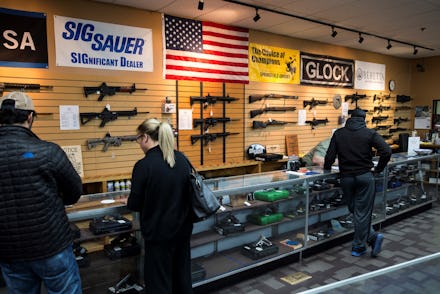As coronavirus panic increases, Americans are stocking up on guns

There's something about a catastrophic global pandemic that brings out the absolute worst in people. From the free market-worshiping right-wing ghouls who would gladly kill your grandmother for a marginal bump of that sweet, sweet stock market, to the petty ramblings of a commander in chief who would seemingly rather risk mass death than spend one more minute locked up in the White House with his supermodel wife and teenage son, the coronavirus outbreak has succeeded in highlighting some of America's most egregious grotesqueries.
But perhaps nothing encapsulates just how much we've failed as a culture as the astronomical, almost (almost) comedic surge in gun purchases. Because, if there's one thing that'll help see us through to the other end of this mass public health crisis, it's leaning into another one. What could be more American than that?
Across the country, concerned citizens are lining up to buy guns in such high volume that in North Carolina — a state that just four years ago elected a gun store owner with zero political experience to the United States Congress — one law enforcement official has instituted a month-long moratorium on issuing new handgun and concealed carry permits. It's a move Wake County Sheriff Gerald Baker linked directly to panic over coronavirus.
"If things go bad in the next couple weeks ... and people are panicking and rioting and looting, the government and the police will not have the ability to protect us."
"Our staff has been inundated with high volumes of permit applications that has made it impossible to process by law," Baker said in a press release announcing the new policy, which went into effect Wednesday. According to a Wake County sheriff's office spokesperson, demand for new firearm and concealed carry permits has skyrocketed 250% — last year at this time there were around 90 permit applications daily, while this past week there were an average of 290 per day, the sheriff's office reported.
"We have to limit folks coming in contact with each other,” a Wake County Sheriff's office spokesperson explained during a press conference announcing the new policy. “It was also a health concern for our staff."
And Wake County isn't alone. Across parts of southern Pennsylvania, multiple counties' sheriff-operated concealed permit offices were temporarily closed or otherwise limiting their ability to issue new permits, due to high demand.
"What we’re finding is first-time [gun] buyers are a high percentage of our [firing range] customers,” Pennsylvania shooting range owner Ty Eggemeyer told the Post-Gazette. “People who would not normally be gun owners are thinking they must now protect their homes."
"It's really just a matter of, if things go bad in the next couple weeks to couple of months and people are panicking and rioting and looting, the government and the police will not have the ability to protect us," one Los Angeles gun buyer explained to NPR. "That's really the main issue, it's not really out of fear, it's just out of being prepared."
Alarmingly, the surge in gun buying comes as just as organizations in the fight against domestic abuse warn that the measures taken to protect against coronavirus — including sheltering in place — could lead to a "worst case scenario" for people living in potentially violent domestic situations.
"People are saying that they can’t believe they’ll be stuck with their abuser, and that they don’t know how they’re going to get through this period of quarantine," family lawyer Al Provinziano told the Los Angeles Times, nothing that domestic violence calls to his law firm had doubled in the past week.
And given the documented links between gun ownership and domestic-violence related dangers to women in particular, it's hard not to see the combination of the surge in firearm purchases with the exacerbation of circumstances that can lead to domestic violence in the first place as a truly frightening development. "Domestic violence is rooted in power and control" — two things that slip away during a crisis, National Domestic Violence Hotline CEO Katie Ray-Jones told the LA Times.
Ironically, the surge in gun interest comes as the National Rifle Association plans mass lay-offs and salary reductions for its staff, as coronavirus has interfered with its normal operations. Which isn't to say they're giving up entirely.
"We believe these actions will favorably position the association leading up to the November election," an NRA spokesperson told NPR in a statement this week. "We will continue to lead the fight to protect our Second Amendment, the First Amendment, and all our constitutional freedoms for years to come."